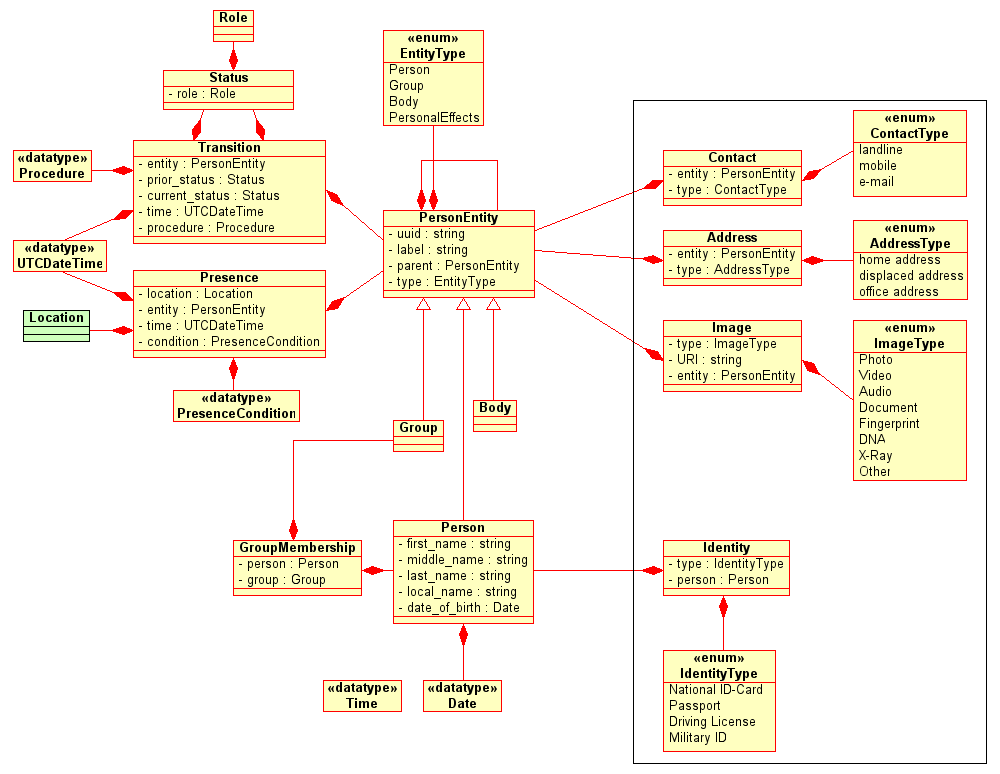| Version 28 (modified by , 16 years ago) ( diff ) |
|---|
Table of Contents
VITA Person Entity Model
Version 2.0 - under construction
VITA is an application design for storage, manipulation and communication of person-related information in emergency management software applications. It defines a set of data structures, interfaces and interoperability features to be implemented by EM software applications.
Overview
VITA defines:
- an extensible data model for tagging, tracking and tracing of person entities (PT3)
- a set of interfaces to request and manipulate person entity data
- an XML-based data format to communicate person entity data (for EDXL-DE Payload)
The PT3 Data Model
under construction
Person Entity
Presence Log
Presence means the fact, that an entity is physically there at a particular location at a particular time. This abstract construction covers even cases of explicit absence, i.e. when the entity is not present at that location at that time.
VITA applications record a presence log for each person entity. Each log entry is established through a recognition event, i.e. when the entity is recognized by a dedicated observer (human or automatic).
Recognition might happen implicitly, e.g. when other data are obtained directly from the entity. In these cases, the time and location of the observer are used for the record. Recognition can also happen explicitly, i.e. in response to observation requests. In such cases, the observation time and location determined by the request are used.
Locations in presence records represent geospatial features, which can basically be of any valid feature class (points, polygons, lines etc.). Where references to locations are used, they must be universally unique and resolvable; otherwise the referred geospatial information have to be enclosed in the database and/or communication.
In contrast to that, time in this regard means one exact time point, to be stored as coordinated universal time (UTC, Gregorian date including century) with a minimum precision of one second. References or relative times must not be used.
Identity
Contact Information
Address Information
Role and Status
Person
Names
Names are used to identify persons in human communication. However, names of persons do not have to be unique nor do they have to be exact, and thus are no reliable identity features. The following name fields are mandatory to exist in person records:
- first_name the first names (or the only name) of the person, in romanized script
- middle_name the person's middle name (if customary), in romanized script
- last_name the last name (mostly the family name) of the person, in romanized script
- local_name the full name of the person, in a local language and script
- Any of these mandatory name fields may be empty in a particular record except first_name.
- A name field value starting with a question mark ? indicates that this part of the name is uncertain or unknown.
- 'first', 'middle' and 'last' refer rather to the usual writing order of a person's full name than to the meaning of the name parts.
- There is no need to split the full name into segments if that is not customary in the person's country of origin - in such case first_name should represent the person's full name.
- In case there are multiple local languages, the local_name should be in the language/script that is most likely readable by that person and/or their relatives.
- An application may define additional name fields to represent e.g. titles, nicknames or pseudonyms, however, these additional fields must not be used to repeat or replace any of the mandatory fields.
Group
Findings
Functions
Interfaces
UUIDs
PT3F XML Format
under construction
The VITA XML format provides EDXL-DE payloads, and it is meant to supersede the Person Finder Interchange Format.
For the time being, this XML format shall be referred to as PT3F.
Implementations
- SahanaPy Person Management (in progress)
Attachments (2)
-
vita.png
(66.6 KB
) - added by 16 years ago.
Data Model Overview
- person_data_axes.png (8.3 KB ) - added by 15 years ago.
Download all attachments as: .zip


